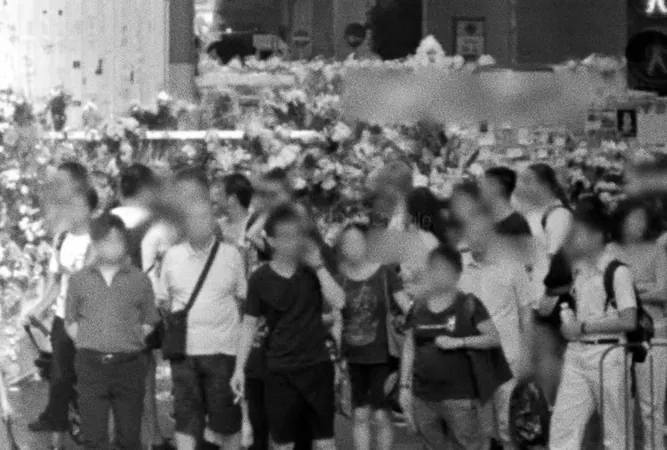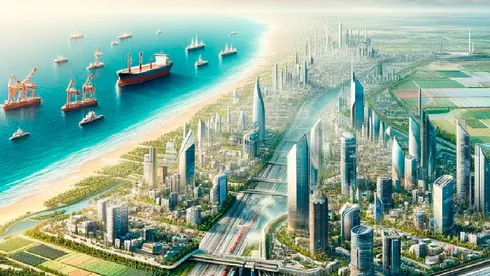
Hong Kong's Cinematic Identity: A Journey Through Time and Change
2025-08-23
Author: Jessica Wong
From Fishing Village to Global Metropolis
Hong Kong's evolution from a humble fishing village to a bustling, glittering metropolis has always defied easy visualization. With a rich history spanning over two centuries, this city has transformed dramatically, becoming a pivotal international financial hub. Ackbar Abbas, in his seminal 1997 work *Hong Kong: Culture and the Politics of Disappearance*, pointed out that the region often feels more like a transit hub than a definitive destination.
The Complexity of a Growing City
Before the British Empire acquired Hong Kong in 1842, it was home to about 7,500 residents. The British lease of the Kowloon Peninsula and the New Territories turned it into an essential trade route, primarily serving commerce between China and the global market. This unique status birthed a novel form of laissez-faire capitalism, which by 1980, renowned economist Milton Friedman would describe as an exemplary representation of free-market functionality.
A City of Contrasts and Conflicts
Hong Kong’s skyline has constantly evolved, marked by property speculation and architectural upheaval that reflects its turbulent social fabric. Waves of refugees and migrants shaped its urban landscape, which intriguingly merges cultural elements with cutting-edge global designs. The region’s political landscape has been equally unstable, especially after the 1997 handover that tethered its fate to mainland China under a complex 'one country, two systems' framework.
Film: A Reflection of Reality
Filmmakers in Hong Kong have long struggled to articulate the chaotic essence of their city. Notably, Chan Hau Chun emerges as a unique voice in this ongoing narrative. Her recent film *Map of Traces* serves as a poignant epistolary reflection on the city’s collective memory and identity while echoing sentiments of nostalgia and modern alienation.
A Nostalgic Lens on Hong Kong’s Past
The vibrant cinematic landscapes of the late 1980s and 1990s showcase a golden age of film, characterized by iconic directors like Wong Kar-wai and John Woo. Their works, often featuring dazzling visuals and unforgettable narratives, provide a hyper-stylized lens through which to experience Hong Kong's bustling life, encapsulating the tension between legality and illicit endeavors.
New Challenges and New Voices
Post-1997, the mood shifted dramatically in films such as Fruit Chan's *Made in Hong Kong*, which portrayed the struggles of disillusioned youth against a precarious backdrop of gang violence—a stark contrast to the flamboyant escapism of earlier films. As filmmakers faced new geopolitical realities, many sought opportunities in mainland China or Hollywood, leading to a migration of talent and a shift in storytelling.
Chan Hau Chun: Redefining the Narrative
Chan Hau Chun's work stands apart as she explores the more intimate, domestic aspects of Hong Kong life, often eschewing grand public spaces for personal stories that resonate with everyday struggles. Her films like *32+4* offer a raw insight into family dynamics and the complexities of growing up in a divided society, highlighting broader themes of displacement and belonging.
Map of Traces: A Modern Exploration of Identity
In *Map of Traces*, Chan deftly intertwines personal letters with the reality of living in an ever-changing cityscape. Using technology, such as Google Maps, to navigate her memories and experiences, she captures the essence of Hong Kong as a place caught between existence and absence. The film poignantly highlights personal and collective histories amidst political unrest, reflecting on the elusiveness of identity and meaning.
Conclusion: A City in Flux
Through her innovative, diary-like storytelling, Chan Hau Chun offers a fresh lens on Hong Kong, emphasizing individual experiences that are often overlooked. As the city continues to grapple with its identity amidst ongoing change, her work serves as a vital reminder of how the inhabitants of Hong Kong navigate their evolving realities, providing a unique perspective on a territory often defined by ambiguity.





 Brasil (PT)
Brasil (PT)
 Canada (EN)
Canada (EN)
 Chile (ES)
Chile (ES)
 Česko (CS)
Česko (CS)
 대한민국 (KO)
대한민국 (KO)
 España (ES)
España (ES)
 France (FR)
France (FR)
 Hong Kong (EN)
Hong Kong (EN)
 Italia (IT)
Italia (IT)
 日本 (JA)
日本 (JA)
 Magyarország (HU)
Magyarország (HU)
 Norge (NO)
Norge (NO)
 Polska (PL)
Polska (PL)
 Schweiz (DE)
Schweiz (DE)
 Singapore (EN)
Singapore (EN)
 Sverige (SV)
Sverige (SV)
 Suomi (FI)
Suomi (FI)
 Türkiye (TR)
Türkiye (TR)
 الإمارات العربية المتحدة (AR)
الإمارات العربية المتحدة (AR)